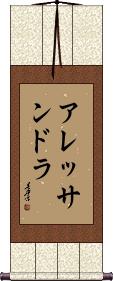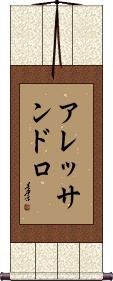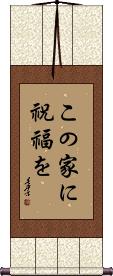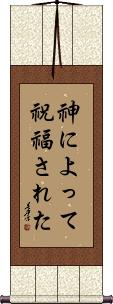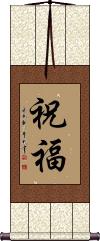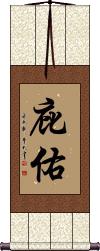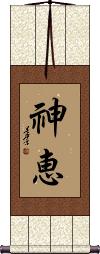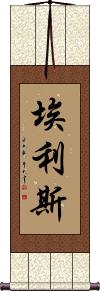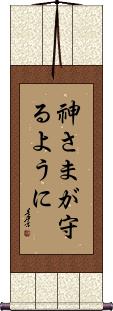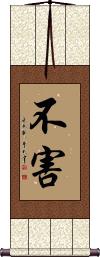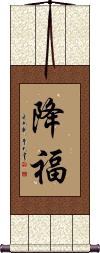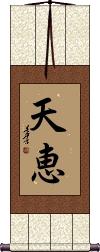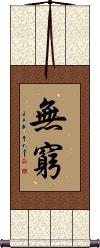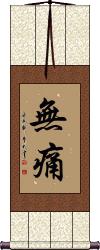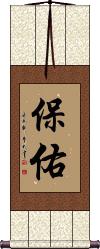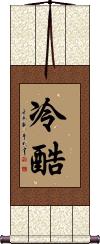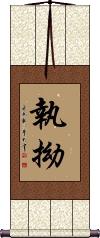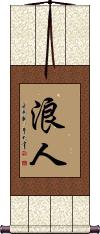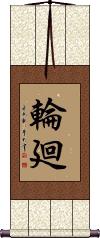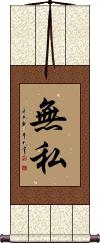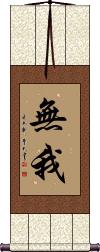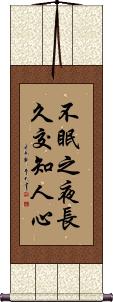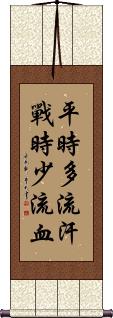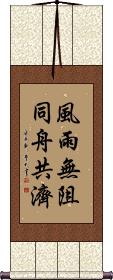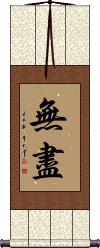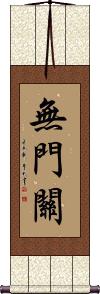Many custom options...
And formats...

Less in Chinese / Japanese...
Buy a Less calligraphy wall scroll here!
Personalize your custom “Less” project by clicking the button next to your favorite “Less” title below...
Switched to secondary search mode due to lack of results using primary.
These secondary results may not be very accurate. Try a different but similar meaning word or phrase for better results. Or...
Look up Less in my Japanese Kanji & Chinese Character Dictionary(My dictionary is a different system then the calligraphy search you just tried)
If you want a special phrase, word, title, name, or proverb, feel free to contact me, and I will translate your custom calligraphy idea for you.
1. Alessa
2. Alessandra
3. Alessandro
4. Alessi
5. Alessia
6. Alessio
10. Blessed by God
14. Divine Blessing
15. Grace of God / Divine Blessing
16. Elessar
17. Elless
19. God Bless You
20. God Bless You / May God Protect You
21. God Bless You / God Be With You
23. Heaven Blessing
25. Heaven Blesses the Diligent
26. Infinity / Infinite / Endless / Boundless
27. Mumonkan / The Gateless Gate
28. Painless
32. Ronin / Masterless Samurai
33. Samsara / Endless Cycle of Rebirth
34. Selflessness
35. Only the sleepless know the length of night
36. The More We Sweat in Training, The Less We Bleed in Battle
37. Timeless Beauty
38. Overcome: Regardless of the Rain and Wind
39. Regardless of the Weather, We Overcome Troubles Together
Alessa
Alessa
Alessandra
Alessandra
Alessandro
Alessandro
Alessandro
Alessi
Alessi
Alessia
Alessia
Alessio
Alessio
Alessio
Content and Motionless
The condition of perfect meditation
安住不動 means at peace and immovable.
The first two Kanji mean being content with one's present position or well-composed.
The last two Kanji mean immobile, firmness, fixed, and/or motionless.
In the Zen school, this is being well-composed and immovable - the ideal state of Zen meditation.
Blessings on this Home
五福臨門 means “five good fortunes arrive [at the] door.”
It is understood to mean “may the five blessings descend upon this home.”
These blessings are known in ancient China to be: longevity, wealth, health, virtue, and natural death (living to old age). This is one of several auspicious sayings you might hear during the Chinese New Year.
Bless this House
This means “Bless this house” or “Bless this home,” in Japanese.
Some may also translate this as “Bless this family,” since the Kanji for home can also mean family.
Note: Because this selection contains some special Japanese Hiragana characters, it should be written by a Japanese calligrapher.
Blessed by God
Blessings and Protection
Blessings and Good Wishes
祝福 is a nice way to give good wishes to someone.
It can be a general blessing or used to congratulate someone for a special occasion or graduation.
This has a good meaning in Japanese but is more appropriate when expressed orally. 祝福 is not a natural selection for a wall scroll if your audience is Japanese.
Bloodless Victory
Perhaps a pacifist view or perhaps the best kind of victory; 兵不血刃 reflect this idea:
The edges of the swords not being stained with blood.
You could also translate it as: Win victory without firing a shot.
The first character means army or force. The second character means without or none. The last two characters mean bloodstained knives. So it represents a returning victorious army without bloodstained knives. 兵不血刃 is the very literal sense of this Chinese proverb. The title definition is more accurate to the way this proverb is understood.
Asking yourself why the direct or literal translation is different?
...Think of compound words in English such as “nevertheless” if we break it apart to “never the less,” we will have trouble getting the real definition of “in spite of that.” Similar things happen when multiple characters create a compounded word in Chinese.
Divine Blessing
Grace of God / Divine Blessing
Elessar
Elessar
Elless
Elless
Fearless / Daring
大胆不敵 is a Japanese word that can mean a few things depending on how you read it.
Popular translations include fearless, audacity (the attitude of a) daredevil, or daring.
The first two Kanji create a word that means: bold, fearless, or daring; audacious.
The last two Kanji create a word meaning: no match for, cannot beat, daring, fearless, intrepid, bold, or tough.
As with many Japanese words, the two similar-meaning words work together to multiply the meaning and intensity of the whole 4-Kanji word.
God Bless You
God Bless You / May God Protect You
上帝保佑 is a blessing exchanged between Chinese Christians.
The first two characters mean God (The God of Zion). The second two characters express the idea of giving protection. Another way to translate this is “May God protect you.”
See Also: Guardian Angel
God Bless You / God Be With You
神さまが守るように is about as close as you can get to, “God Bless You” in Japanese.
This literally means “[May] God Protect [You].” It can also mean “God is Always With You,” as the word in this phrase that means “protect” can also mean to follow or be with. In fact, the Japanese dictionary entry for that word reads like this: to protect; to guard; to defend; to keep (i.e. a promise); to abide; to observe; to follow.
Note: Because this selection contains some special Japanese Hiragana characters, it should be written by a Japanese calligrapher.
Do No Harm / Harmless
Heaven Blessing
Blessed by Heaven
天恵 means “Heaven's Blessing,” “Blessings from Heaven,” or “Blessed by Heaven” in Japanese Kanji.
Depending on the context in which this is used, it can also mean “gift of nature,” or even “natural resources” (as in Heaven or God bestowed things like oil, iron, gold, and other natural resources upon mankind).
Heaven Blesses the Diligent
天道酬勤 can be interpreted in a few different ways:
God blesses those who work hard.
It is the way of Heaven to smile on the diligent.
God will reward those that are worthy.
Heaven blesses those who are diligent.
Whichever translation you like, a scroll like this on your wall may serve as a reminder to work hard because your diligence will pay off both in this life and the next.
Note: This can be pronounced in Korean, but it's not a commonly used term.
Infinity / Infinite / Endless / Boundless
(Chinese / Korean)
無窮 is the Chinese and Korean word meaning infinity, eternity, infinitude, infinite or endless.
無窮 literally translates as “without [ever becoming] exhausted/poor,” and in that context, can mean “inexhaustible” or “boundless” but this is usually read as “without end.” Some extended definitions include eternity, infinitude, or immortality.
In certain contexts, it can mean “immortality.”
The first character means “never” or “not.” The second means “exhausted,” “finished,” or “ending.”
Note: 無窮 is a Japanese word but rarely used in modern Japan.
Mumonkan / The Gateless Gate
無門関 is the specifically Japanese title for “The Gateless Barrier.”
This has both direct meaning and is the title of a 13th-century collection of koans, compiled by Zen Master Mumon (actually a Chinese Chan Master known as Wumen in China).
The original title is 無門關, but the last Kanji was simplified to 関 in modern Japan.
Painless
無痛 is the Chinese, Japanese Kanji, and old Korean Hanja for painless or without pain.
無痛 is not a common title for a wall scroll, so select this only if it has a deep personal meaning to you.
Blessings and Protection
保佑 is the more religious and sometimes superstitious word for protection in Chinese. It's sort of a blessing of protection and is often translated as “bless and protect,” “blessing,” or “to bless.”
This would be used as the protection or blessing that a deity (such as God) would bestow upon you. It is not religion-specific in the same way a language cannot be specific to any religion.
![]() Note: Sometimes the second character is written in the form shown to the right. Let us know if you have a preference when you place your order.
Note: Sometimes the second character is written in the form shown to the right. Let us know if you have a preference when you place your order.
See Also: Guardian Angel
Relentless / Ruthless
冷酷 means relentless or ruthless in Chinese, and Japanese Kanji.
It can also be translated as grim, unfeeling, callous, cruel, or cold-hearted.
This is a rather negative word. it’s really inappropriate for a wall scroll, so please don’t order this unless you really want to shock Asian people who see it.
Relentless / Stubborn
執拗 means relentless or stubborn in Chinese, Japanese Kanji, and old Korean Hanja.
It can also be translated as willful, pigheaded, persistent, obstinate, tenacious, insistent, importunate, or persevering.
This is a rather negative word. it’s really inappropriate for a wall scroll, so please don’t order this unless you really want to shock Asian people who see it.
Ronin / Masterless Samurai
The 浪人 or Ronin have no master - The most famous are the 47 ronin created after their Lord committed suicide. This term was not a positive title for the Samurai of ancient Japan. However, in recent years, movies and video games have glorified the term Ronin.
In Chinese, this term has the original meaning of a hobo, vagabond, or ruffian.
In Korean Hanja, these characters would be read as adventurer, wanderer, someone without a steady job, or someone who is wasting away time.
In modern Japan, this term is used as a nickname for a high school student who has failed a college entry exam (and is trying again).
In Chinese and Korean, the Japanese definition of “Masterless Samurai” is known because of the historical context. Even in Japanese, the literal translation is closer to the Chinese and Korean definitions shown above.
This will make a fine wall scroll if you are a fan of the Ronin or see yourself as a Ronin of sorts. However, please think twice before getting a Ronin tattoo!
Samsara / Endless Cycle of Rebirth
輪廻 is one of a few ways to express संसार or Saṃsāra in Chinese, Japanese, and old Korean.
The Buddhist term can be translated in several ways, including:
An endless cycle of death and rebirth.
The turning of the wheel.
To revolve.
Transmigration in six ways.
The wheel of transmigration.
The round of existence.
Selflessness
無私 would be literally translated as “none self” in Chinese, Korean, and Japanese.
It is used to express “selflessness” or “unselfish.”
無私 is a popular term for the idea of being selfless or unselfish in modern China and Japan.
This term is not as commonly used in Korea but still has good meaning.
Selflessness
無我 is a more common way to say selflessness in Japanese. This literally means “no self,” or a better translation might be “not thinking of oneself.” 無我 is also understood in Chinese and Korean. 無我 is a very old word in CJK languages.
無我 is the word a Buddhist would use to express the idea of selflessness or unselfishness. For Korean Buddhists, it can mean self-renunciation.
See Also: Altruism
Only the sleepless know the length of night
不眠之夜长久交知人心 literally translates as: [Only one who does] not sleep, learns how long the night is; [Only by] long acquaintance [does one] learn a person ['s true] character.
Basically, this proverb suggests that we really need to experience something intimately and for a long time to really know everything about it.
This can also be translated as “Spending years with someone is the only way to know them.”
Note: Sometimes this proverb is split into just the first or second idea alone (first 5 or last 5 characters only).
The More We Sweat in Training, The Less We Bleed in Battle
There is more than one way to translate the ancient Chinese military proverb, 平时多流汗战时少流血. Here are a few interpretations:
A drop of sweat spent in a drill is a drop of blood saved in war.
More practice will give one a better chance of success in real situations.
The more you sweat in training, the less you bleed in battle.
I heard this many times when I was a U.S. Marine but I had no idea at the time that it was actually an old Chinese proverb.
See Also: Blood Sweat and Tears
Timeless Beauty
Overcome: Regardless of the Rain and Wind
風雨無阻 is a proverb that is often translated as “Go ahead as planned regardless of the weather” or, “[Overcome] despite the rain and wind.”
This is a Chinese proverb that suggests that you are willing (or should be willing) to overcome any adversity, and accomplish your task at hand.
There is a second/optional part to this phrase that suggests that you should do this together with someone (see our other 8-character version if you want the full phrase).
Regardless of the Weather, We Overcome Troubles Together
The first four characters are often translated as “Go ahead as planned regardless of the weather” or, “[Overcome] despite the rain and wind.” The last four characters can mean “Stick together” but literally means “Take the same boat [together].”
風雨無阻同舟共濟 is a Chinese proverb that suggests that you are willing (or should be willing) to overcome any adversity, and accomplish your task at hand. The second part (last four characters) is sometimes left off but this second part strongly suggests that you should overcome that adversity together.
Endless / Without Limit
無盡 is the Chinese, Japanese Kanji, and old Korean Hanja for endless; inexhaustible; without limits; infinite.
In the Buddhist context, this can refer to the infinitude of living beings, of worlds, of space, of the dharmadhātu, of nirvāṇa, etc.
The Gateless Gate
無門關 is the ancient title for “The Gateless Barrier.”
This has both direct meaning and is the title of a 13th-century collection of koans, compiled by a Chinese Chan Master known as Wumen in China (known in Japan as Zen Master Mumon).
While this is the original title, you may see this written as 無門関 in Japan, where the last character, 關, was simplified to 関 after 1945.
These search terms might be related to Less:
The following table may be helpful for those studying Chinese or Japanese...
| Title | Characters | Romaji (Romanized Japanese) | Various forms of Romanized Chinese | |
| Alessa | 愛麗莎 爱丽莎 | ài lì shā ai4 li4 sha1 ai li sha ailisha | ||
| Alessa | アレッサ | aressa / aresa | ||
| Alessandra | 亞歷山德拉 亚历山德拉 | yà lì shān dé lā ya4 li4 shan1 de2 la1 ya li shan de la yalishandela | ya li shan te la yalishantela |
|
| Alessandra | アレッサンドラ | aressandora aresandora | ||
| Alessandro | 亞歷山德羅 亚历山德罗 | yà lì shān dé luó ya4 li4 shan1 de2 luo2 ya li shan de luo yalishandeluo | ya li shan te lo yalishantelo |
|
| Alessandro | 阿歷桑德羅 阿历桑德罗 | ā lì sāng dé luó a1 li4 sang1 de2 luo2 a li sang de luo alisangdeluo | a li sang te lo alisangtelo |
|
| Alessandro | アレッサンドロ | aressandoro aresandoro | ||
| Alessi | 阿萊西 阿莱西 | ā lái xī a1 lai2 xi1 a lai xi alaixi | a lai hsi alaihsi |
|
| Alessi | アレッシ | aresshi / areshi | ||
| Alessia | 阿萊西亞 阿莱西亚 | ā lái xī yà a1 lai2 xi1 ya4 a lai xi ya alaixiya | a lai hsi ya alaihsiya |
|
| Alessia | アレッシア | aresshia / areshia | ||
| Alessio | 阿萊西奧 阿莱西奥 | ā lái xī ào a1 lai2 xi1 ao4 a lai xi ao alaixiao | a lai hsi ao alaihsiao |
|
| Alessio | 阿雷西歐 阿雷西欧 | ā léi xī ōu a1 lei2 xi1 ou1 a lei xi ou aleixiou | a lei hsi ou aleihsiou |
|
| Alessio | アレッシオ | aresshio / areshio | ||
| Content and Motionless | 安住不動 安住不动 | an juu fu dou anjuufudou an ju fu do | ||
| Blessings on this Home | 五福臨門 五福临门 | wǔ fú lín mén wu3 fu2 lin2 men2 wu fu lin men wufulinmen | ||
| Bless this House | この家に祝福を | kono-ka ni shukufuku o kono-kanishukufukuo | ||
| Blessed by God | 神によって祝福された | kami ni yotte shukufuku sa remashita | ||
| Blessings and Protection | 祝福と保護 | shukufuku to hogo shukufukutohogo | ||
| Blessings and Good Wishes | 祝福 | shukufuku | zhù fú / zhu4 fu2 / zhu fu / zhufu | chu fu / chufu |
| Bloodless Victory | 兵不血刃 | bīng bù xuè rèn bing1 bu4 xue4 ren4 bing bu xue ren bingbuxueren | ping pu hsüeh jen pingpuhsüehjen |
|
| Divine Blessing | 庇佑 / 庇祐 庇佑 | bì yòu / bi4 you4 / bi you / biyou | pi yu / piyu | |
| Grace of God Divine Blessing | 神恵 / 神惠 神恵 | shin kei / shinkei | ||
| Elessar | 埃萊薩 埃莱萨 | āi lái sà ai1 lai2 sa4 ai lai sa ailaisa | ||
| Elessar | エレッサー | eressaa / eresa | ||
| Elless | 埃利斯 | āi lì sī ai1 li4 si1 ai li si ailisi | ai li ssu ailissu |
|
| Elless | エルレス | eruresu | ||
| Fearless Daring | 大膽不敵 大胆不敵 | dai tan fu teki daitanfuteki | ||
| God Bless You | お大事に | odaijini | ||
| God Bless You May God Protect You | 上帝保佑 | shàng dì bǎo yòu shang4 di4 bao3 you4 shang di bao you shangdibaoyou | shang ti pao yu shangtipaoyu |
|
| God Bless You God Be With You | 神さまが守るように | kami sa ma ga mamo ru you ni kamisamagamamoruyouni kami sa ma ga mamo ru yo ni | ||
| Do No Harm Harmless | 不害 | fu gai / fugai | bù hài / bu4 hai4 / bu hai / buhai | pu hai / puhai |
| Heaven Blessing | 降福 | jiàng fú / jiang4 fu2 / jiang fu / jiangfu | chiang fu / chiangfu | |
| Blessed by Heaven | 天恵 | ten kei / tenkei | ||
| Heaven Blesses the Diligent | 天道酬勤 | tiān dào chóu qín tian1 dao4 chou2 qin2 tian dao chou qin tiandaochouqin | t`ien tao ch`ou ch`in tientaochouchin tien tao chou chin |
|
| Infinity Infinite Endless Boundless | 無窮 无穷 | mu kyuu / mukyuu / mu kyu | wú qióng / wu2 qiong2 / wu qiong / wuqiong | wu ch`iung / wuchiung / wu chiung |
| Mumonkan The Gateless Gate | 無門関 | mu mon kan / mumonkan | ||
| Painless | 無痛 | mutsuu / mutsu | wú tòng / wu2 tong4 / wu tong / wutong | wu t`ung / wutung / wu tung |
| Blessings and Protection | 保佑 / 保祐 保佑 | bǎo yòu / bao3 you4 / bao you / baoyou | pao yu / paoyu | |
| Relentless Ruthless | 冷酷 | reikoku | lěng kù / leng3 ku4 / leng ku / lengku | leng k`u / lengku / leng ku |
| Relentless Stubborn | 執拗 执拗 | shitsu you / shitsuyou / shitsu yo | zhí niù / zhi2 niu4 / zhi niu / zhiniu | chih niu / chihniu |
| Ronin Masterless Samurai | 浪人 | rou nin / rounin / ro nin | làng rén / lang4 ren2 / lang ren / langren | lang jen / langjen |
| Samsara Endless Cycle of Rebirth | 輪廻 轮廻 | rinne | lún huí / lun2 hui2 / lun hui / lunhui | |
| Selflessness | 無私 无私 | mushi | wú sī / wu2 si1 / wu si / wusi | wu ssu / wussu |
| Selflessness | 無我 无我 | muga | wú wǒ / wu2 wo3 / wu wo / wuwo | |
| Only the sleepless know the length of night | 不眠之夜長久交知人心 不眠之夜长久交知人心 | bù mián zhī yè cháng jiǔ jiāo zhī rén xīn bu4 mian2 zhi1 ye4 chang2 jiu3 jiao1 zhi1 ren2 xin1 bu mian zhi ye chang jiu jiao zhi ren xin | pu mien chih yeh ch`ang chiu chiao chih jen hsin pu mien chih yeh chang chiu chiao chih jen hsin |
|
| The More We Sweat in Training, The Less We Bleed in Battle | 平時多流汗戰時少流血 平时多流汗战时少流血 | píng shí duō liú hàn zhàn shí shǎo liú xuè ping2 shi2 duo1 liu2 han4 zhan4 shi2 shao3 liu2 xue4 ping shi duo liu han zhan shi shao liu xue | p`ing shih to liu shih shao liu hsüeh ping shih to liu shih shao liu hsüeh |
|
| Timeless Beauty | 永恆之美 永恒之美 | yǒng héng zhī měi yong3 heng2 zhi1 mei3 yong heng zhi mei yonghengzhimei | yung heng chih mei yunghengchihmei |
|
| Overcome: Regardless of the Rain and Wind | 風雨無阻 风雨无阻 | fēng yǔ wú zǔ feng1 yu3 wu2 zu3 feng yu wu zu fengyuwuzu | feng yü wu tsu fengyüwutsu |
|
| Regardless of the Weather, We Overcome Troubles Together | 風雨無阻同舟共濟 风雨无阻同舟共济 | fēng yǔ wú zǔ tóng zhōu gòng jì feng1 yu3 wu2 zu3 tong2 zhou1 gong4 ji4 feng yu wu zu tong zhou gong ji fengyuwuzutongzhougongji | feng yü wu tsu t`ung chou kung chi feng yü wu tsu tung chou kung chi |
|
| Endless Without Limit | 無盡 无尽 | mu jin / mujin | wú jìn / wu2 jin4 / wu jin / wujin | wu chin / wuchin |
| The Gateless Gate | 無門關 无门关 | mu mon kan / mumonkan | wú mén guān wu2 men2 guan1 wu men guan wumenguan | wu men kuan wumenkuan |
| In some entries above you will see that characters have different versions above and below a line. In these cases, the characters above the line are Traditional Chinese, while the ones below are Simplified Chinese. | ||||
Successful Chinese Character and Japanese Kanji calligraphy searches within the last few hours...



